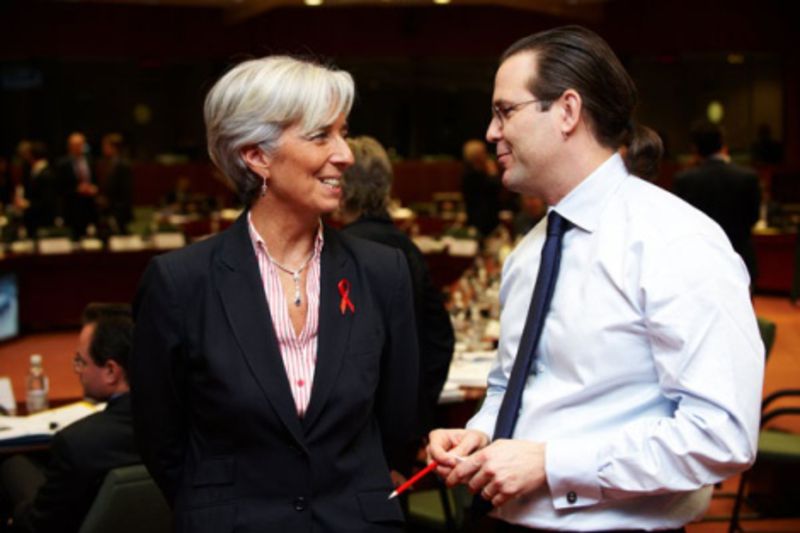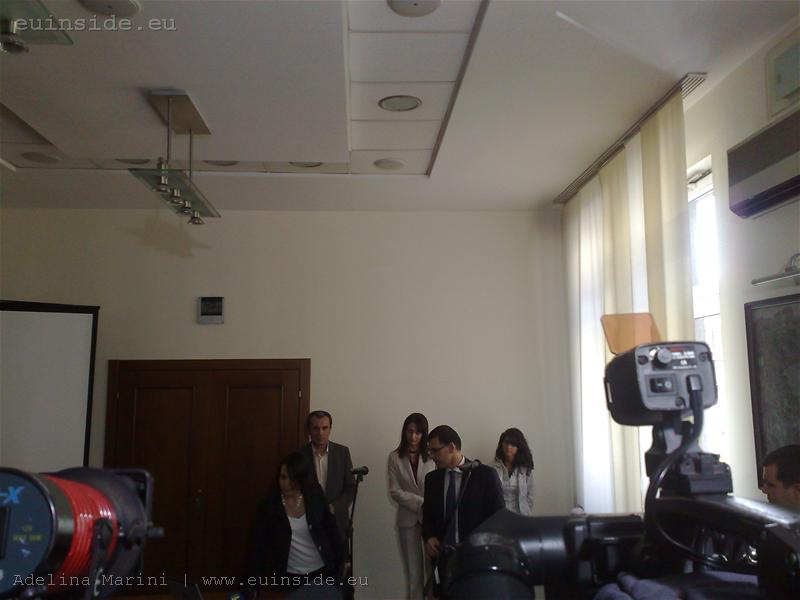The outgoing minister of finance of Bulgaria reported good state of finances with terrible humour
Adelina Marini, July 20, 2009
 92.1% is the implementation of the budget incomes from the beginning of the year, compared to the same period of last year. According to what the government has planned, the realisation is 39.7%. Last year the realisation for the same period was 51.6%. The tax revenues for the same period are 10, 124 bn lv. (5,191 bn euro) and the realisation is 39.4%. Last year by July the tax revenues were 50.3%. These are data from the report the minister of finance in resignation Plamen Oresharski presented today amid growing speculations of budget failures and pre-election overspending. The most serious drop in the budget revenues is with the VAT because the import has fallen sharply with 40% since the beginning of the year and the import is one of the main generators of VAT. A little over 3 bn lv (1.538 bn euro) is the revenue from VAT which is 35.5% of the expectations, compared to 47.3% for the first half of 2008.
92.1% is the implementation of the budget incomes from the beginning of the year, compared to the same period of last year. According to what the government has planned, the realisation is 39.7%. Last year the realisation for the same period was 51.6%. The tax revenues for the same period are 10, 124 bn lv. (5,191 bn euro) and the realisation is 39.4%. Last year by July the tax revenues were 50.3%. These are data from the report the minister of finance in resignation Plamen Oresharski presented today amid growing speculations of budget failures and pre-election overspending. The most serious drop in the budget revenues is with the VAT because the import has fallen sharply with 40% since the beginning of the year and the import is one of the main generators of VAT. A little over 3 bn lv (1.538 bn euro) is the revenue from VAT which is 35.5% of the expectations, compared to 47.3% for the first half of 2008.
The spendings, according to the report, including Bulgaria's payment to the EU budget, for the first 6 months of the year are 12,754 bn lv (6, 54 bn euro) which is 42% of the annual expectations, compared to 40.5% for the same period of last year.
The buffers in the budget are more than 4 bn lv. So far, the non-realisation of the revenues is some 2.1 bn lv. There are some 400-500 mn lv that the state is holding up in the form of tax credit from VAT. This money is due to be returned to the companies but, as it turned to be the practice for the last few years, in fact there are no deadlines. The new government of Mr. Boyko Borisov promised to cut the deadline to one month and if the state would hold the money more, it should be obliged to pay a delay interest. The current finance minister Plamen Oresharski noted though that he is not quite confident in the sum. The forecasts of the Ministry of Finance is that the GDP will be -2.5% this year. Before mentioning his prognosis he said that the latest estimation of the IMF show that Bulgaria's recession might reach -7% by the end of the year, while the forecast of the European Commission is for -1.8% drop.
The minister of finance also said that the government is leaving a very good financial legacy to the next government, compared to other EU member states. Furthermore, the report of the Ministry  of Finance starts with data comparing the most affected by the crisis EU member states and Bulgaria. Thus, the report says that Ireland might end up the year with 12% budget deficit, Latvia with 11.1%, the UK with 11.5%, Spain - 8.6%. And regarding the expectations for Bulgaria, Mr. Oresharski said that it is possible the year to end up with e balanced budget or a minor deficit, whatever that might mean.
of Finance starts with data comparing the most affected by the crisis EU member states and Bulgaria. Thus, the report says that Ireland might end up the year with 12% budget deficit, Latvia with 11.1%, the UK with 11.5%, Spain - 8.6%. And regarding the expectations for Bulgaria, Mr. Oresharski said that it is possible the year to end up with e balanced budget or a minor deficit, whatever that might mean.
He excluded any possibility of such a large budget deficit that could not be covered by the fiscal reserves. The reserves are 8.2 bn lv (4.2 bn euro) at the moment. "I think that the level of the fiscal reserve right now is a good buffer in the mid-term if the next government would continue to lead a reasonable fiscal policy. And if no budget deficits are allowed, at least - serious deficits". Asked by euinside what does he mean by "serious budget deficit" Mr. Oresharski explained that he would consider as serious deficit of over 3% of GDP.
The new ministers should make a review and decide whether further spending cuts are necessary. "I think that it is correct that a week or two before they start working, that we don't do any cuts", Mr, Oresharski said. His personal opinion is that :new small cuts" will have to be made, but not dramatical ones.
 By freezing the budget salaries the government has saved 280 mn lv (143.58 mn euro). Mr. Oresharski underlined that there is no other government that could freeze salaries just before the elections. Asked by euinside why then the pensions have been increased, the outgoing minister of finance explained that freezing pensions would have required a decision of Parliament, unlike the budgetary salaries which are being approved by the government.
By freezing the budget salaries the government has saved 280 mn lv (143.58 mn euro). Mr. Oresharski underlined that there is no other government that could freeze salaries just before the elections. Asked by euinside why then the pensions have been increased, the outgoing minister of finance explained that freezing pensions would have required a decision of Parliament, unlike the budgetary salaries which are being approved by the government.
Provoked by the abundance of questions of journalists about how possible it is to expect unpleasant surprises by the end of the week, Plamen Oresharski used his awkward sense of humour. Asked how would he explain the worries of the future government that there are many land mines in the budget, Mr. Oresharski answered: "Whatever I say the thesis for the first envelope* will be used non stop until the end of the year, remember this! We will be blamed for everything". And asked what he would do if he was to become a minister of finance tomorrow, he gave quite a rude response: "There was a story about the granny, the grandpa and their sex". He meant a story saying: "If my granny was a man she would have been my grandpa". The story is known in many variations. Later he excused himself for the joke and added that he would not share in public his plans but only with his predecessor.
*There was a story about an executive director who, leaving office gave his successor 3 envelopes and a piece of advice: "Open these envelopes only in times of desperate need, when you don't know what to do". In the first envelope there was a note saying: "Blame for everything your predecessor", the second: "Start immediate structural reforms". and the third said: "Sit down to write your 3 envelopes".
 | © Consilium
| © Consilium | © euinside
| © euinside